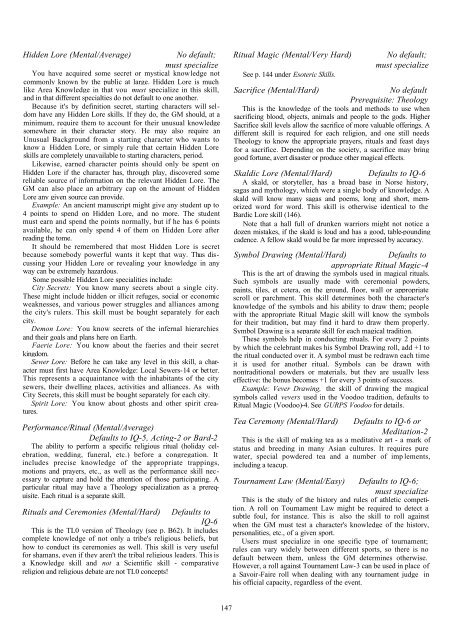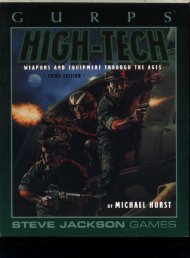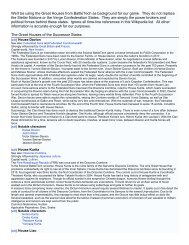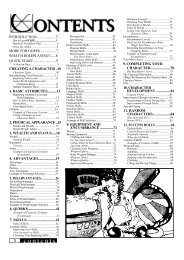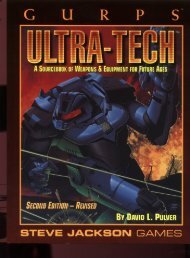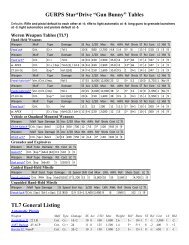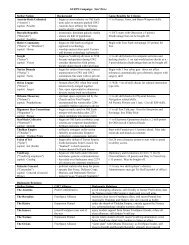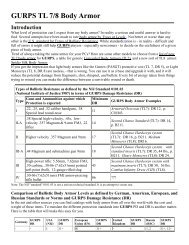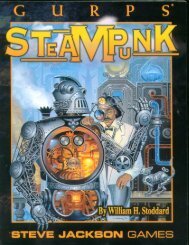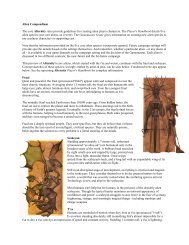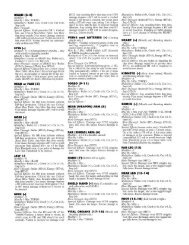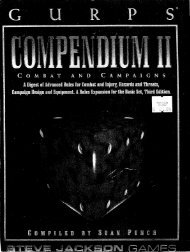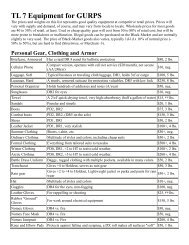GURPS - Compendium 1..
GURPS - Compendium 1..
GURPS - Compendium 1..
Create successful ePaper yourself
Turn your PDF publications into a flip-book with our unique Google optimized e-Paper software.
Hidden Lore (Mental/Average)<br />
No default;<br />
must specialize<br />
You have acquired some secret or mystical knowledge not<br />
commonly known by the public at large. Hidden Lore is much<br />
like Area Knowledge in that you must specialize in this skill,<br />
and in that different specialties do not default to one another.<br />
Because it's by definition secret, starting characters will seldom<br />
have any Hidden Lore skills. If they do, the GM should, at a<br />
minimum, require them to account for their unusual knowledge<br />
somewhere in their character story. He may also require an<br />
Unusual Background from a starting character who wants to<br />
know a Hidden Lore, or simply rule that certain Hidden Lore<br />
skills are completely unavailable to starting characters, period.<br />
Likewise, earned character points should only be spent on<br />
Hidden Lore if the character has, through play, discovered some<br />
reliable source of information on the relevant Hidden Lore. The<br />
GM can also place an arbitrary cap on the amount of Hidden<br />
Lore any given source can provide.<br />
Example: An ancient manuscript might give any student up to<br />
4 points to spend on Hidden Lore, and no more. The student<br />
must earn and spend the points normally, but if he has 6 points<br />
available, he can only spend 4 of them on Hidden Lore after<br />
reading the tome.<br />
It should be remembered that most Hidden Lore is secret<br />
because somebody powerful wants it kept that way. Thus discussing<br />
your Hidden Lore or revealing your knowledge in any<br />
way can be extremely hazardous.<br />
Some possible Hidden Lore specialities include:<br />
City Secrets: You know many secrets about a single city.<br />
These might include hidden or illicit refuges, social or economic<br />
weaknesses, and various power struggles and alliances among<br />
the city's rulers. This skill must be bought separately for each<br />
city.<br />
Demon Lore: You know secrets of the infernal hierarchies<br />
and their goals and plans here on Earth.<br />
Faerie Lore: You know about the faeries and their secret<br />
kingdom.<br />
Sewer Lore: Before he can take any level in this skill, a character<br />
must first have Area Knowledge: Local Sewers-14 or bet ter.<br />
This represents a acquaintance with the inhabitants of the city<br />
sewers, their dwelling places, activities and alliances. As with<br />
City Secrets, this skill must be bought separately for each city.<br />
Spirit Lore: You know about ghosts and other spirit creatures.<br />
Performance/Ritual (Mental/Average)<br />
Defaults to IQ-5, Acting-2 or Bard-2<br />
The ability to perform a specific religious ritual (holiday celebration,<br />
wedding, funeral, etc.) before a congregation. It<br />
includes precise knowledge of the appropriate trappings,<br />
motions and prayers, etc., as well as the performance skill necessary<br />
to capture and hold the attention of those participating. A<br />
particular ritual may have a Theology specialization as a prerequisite.<br />
Each ritual is a separate skill.<br />
Rituals and Ceremonies (Mental/Hard) Defaults to<br />
IQ-6<br />
This is the TL0 version of Theology (see p. B62). It includes<br />
complete knowledge of not only a tribe's religious beliefs, but<br />
how to conduct its ceremonies as well. This skill is very useful<br />
for shamans, even if they aren't the tribal religious leaders. This is<br />
a Knowledge skill and not a Scientific skill - comparative<br />
religion and religious debate are not TL0 concepts!<br />
Ritual Magic (Mental/Very Hard)<br />
See p. 144 under Esoteric Skills.<br />
No default;<br />
must specialize<br />
Sacrifice (Mental/Hard)<br />
No default<br />
Prerequisite: Theology<br />
This is the knowledge of the tools and methods to use when<br />
sacrificing blood, objects, animals and people to the gods. Higher<br />
Sacrifice skill levels allow the sacrifice of more valuable offerings. A<br />
different skill is required for each religion, and one still needs<br />
Theology to know the appropriate prayers, rituals and feast days<br />
for a sacrifice. Depending on the society, a sacrifice may bring<br />
good fortune, avert disaster or produce other magical effects.<br />
Skaldic Lore (Mental/Hard) Defaults to IQ-6<br />
A skald, or storyteller, has a broad base in Norse history,<br />
sagas and mythology, which were a single body of knowledge. A<br />
skald will know many sagas and poems, long and short, memorized<br />
word for word. This skill is otherwise identical to the<br />
Bardic Lore skill (146).<br />
Note that a hall full of drunken warriors might not notice a<br />
dozen mistakes, if the skald is loud and has a good, table-pounding<br />
cadence. A fellow skald would be far more impressed by accuracy.<br />
Symbol Drawing (Mental/Hard) Defaults to<br />
appropriate Ritual Magic-4<br />
This is the art of drawing the symbols used in magical rituals.<br />
Such symbols are usually made with ceremonial powders,<br />
paints, tiles, et cetera, on the ground, floor, wall or appropriate<br />
scroll or parchment. This skill determines both the character's<br />
knowledge of the symbols and his ability to draw them; people<br />
with the appropriate Ritual Magic skill will know the symbols<br />
for their tradition, but may find it hard to draw them properly.<br />
Symbol Drawing is a separate skill for each magical tradition.<br />
These symbols help in conducting rituals. For every 2 points<br />
by which the celebrant makes his Symbol Drawing roll, add +1 to<br />
the ritual conducted over it. A symbol must be redrawn each time<br />
it is used for another ritual. Symbols can be drawn with<br />
nontraditional powders or materials, but they are usually less<br />
effective: the bonus becomes +1 for every 3 points of success.<br />
Example: Vever Drawing, the skill of drawing the magical<br />
symbols called vevers used in the Voodoo tradition, defaults to<br />
Ritual Magic (Voodoo)-4. See <strong>GURPS</strong> Voodoo for details.<br />
Tea Ceremony (Mental/Hard) Defaults to IQ-6 or<br />
Meditation-2<br />
This is the skill of making tea as a meditative art - a mark of<br />
status and breeding in many Asian cultures. It requires pure<br />
water, special powdered tea and a number of imp lements,<br />
including a teacup.<br />
Tournament Law (Mental/Easy) Defaults to IQ-6;<br />
must specialize<br />
This is the study of the history and rules of athletic competition.<br />
A roll on Tournament Law might be required to detect a<br />
subtle foul, for instance. This is also the skill to roll against<br />
when the GM must test a character's knowledge of the history,<br />
personalities, etc., of a given sport.<br />
Users must specialize in one specific type of tournament;<br />
rules can vary widely between different sports, so there is no<br />
default between them, unless the GM determines otherwise.<br />
However, a roll against Tournament Law-3 can be used in place of<br />
a Savoir-Faire roll when dealing with any tournament judge in<br />
his official capacity, regardless of the event.<br />
147


